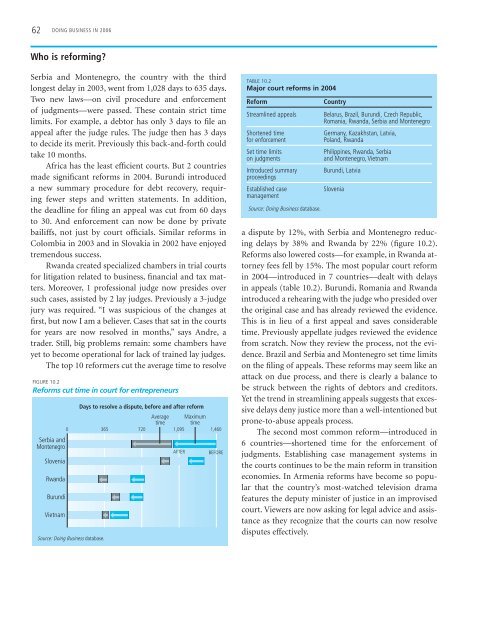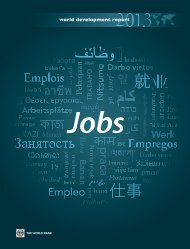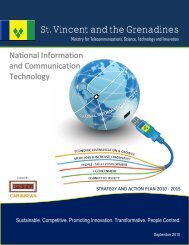Creating
Doing Business in 2006 -- Creating Jobs - Caribbean Elections
Doing Business in 2006 -- Creating Jobs - Caribbean Elections
Create successful ePaper yourself
Turn your PDF publications into a flip-book with our unique Google optimized e-Paper software.
62 DOING BUSINESS IN 2006<br />
Who is reforming?<br />
Serbia and Montenegro, the country with the third<br />
longest delay in 2003, went from 1,028 days to 635 days.<br />
Two new laws—on civil procedure and enforcement<br />
of judgments—were passed. These contain strict time<br />
limits. For example, a debtor has only 3 days to file an<br />
appeal after the judge rules. The judge then has 3 days<br />
to decide its merit. Previously this back-and-forth could<br />
take 10 months.<br />
Africa has the least efficient courts. But 2 countries<br />
made significant reforms in 2004. Burundi introduced<br />
a new summary procedure for debt recovery, requiring<br />
fewer steps and written statements. In addition,<br />
the deadline for filing an appeal was cut from 60 days<br />
to 30. And enforcement can now be done by private<br />
bailiffs, not just by court officials. Similar reforms in<br />
Colombia in 2003 and in Slovakia in 2002 have enjoyed<br />
tremendous success.<br />
Rwanda created specialized chambers in trial courts<br />
for litigation related to business, financial and tax matters.<br />
Moreover, 1 professional judge now presides over<br />
such cases, assisted by 2 lay judges. Previously a 3-judge<br />
jury was required. “I was suspicious of the changes at<br />
first, but now I am a believer. Cases that sat in the courts<br />
for years are now resolved in months,” says Andre, a<br />
trader. Still, big problems remain: some chambers have<br />
yet to become operational for lack of trained lay judges.<br />
The top 10 reformers cut the average time to resolve<br />
<br />
<br />
<br />
<br />
<br />
<br />
<br />
<br />
<br />
<br />
<br />
<br />
<br />
<br />
<br />
<br />
<br />
<br />
TABLE 10.2<br />
Major court reforms in 2004<br />
Reform<br />
Streamlined appeals<br />
Shortened time<br />
for enforcement<br />
Set time limits<br />
on judgments<br />
Introduced summary<br />
proceedings<br />
Established case<br />
management<br />
Source: Doing Business database.<br />
Country<br />
Belarus, Brazil, Burundi, Czech Republic,<br />
Romania, Rwanda, Serbia and Montenegro<br />
Germany, Kazakhstan, Latvia,<br />
Poland, Rwanda<br />
Philippines, Rwanda, Serbia<br />
and Montenegro, Vietnam<br />
Burundi, Latvia<br />
Slovenia<br />
a dispute by 12%, with Serbia and Montenegro reducing<br />
delays by 38% and Rwanda by 22% (figure 10.2).<br />
Reforms also lowered costs—for example, in Rwanda attorney<br />
fees fell by 15%. The most popular court reform<br />
in 2004—introduced in 7 countries—dealt with delays<br />
in appeals (table 10.2). Burundi, Romania and Rwanda<br />
introduced a rehearing with the judge who presided over<br />
the original case and has already reviewed the evidence.<br />
This is in lieu of a first appeal and saves considerable<br />
time. Previously appellate judges reviewed the evidence<br />
from scratch. Now they review the process, not the evidence.<br />
Brazil and Serbia and Montenegro set time limits<br />
on the filing of appeals. These reforms may seem like an<br />
attack on due process, and there is clearly a balance to<br />
be struck between the rights of debtors and creditors.<br />
Yet the trend in streamlining appeals suggests that excessive<br />
delays deny justice more than a well-intentioned but<br />
prone-to-abuse appeals process.<br />
The second most common reform—introduced in<br />
6 countries—shortened time for the enforcement of<br />
judgments. Establishing case management systems in<br />
the courts continues to be the main reform in transition<br />
economies. In Armenia reforms have become so popular<br />
that the country’s most-watched television drama<br />
features the deputy minister of justice in an improvised<br />
court. Viewers are now asking for legal advice and assistance<br />
as they recognize that the courts can now resolve<br />
disputes effectively.

















